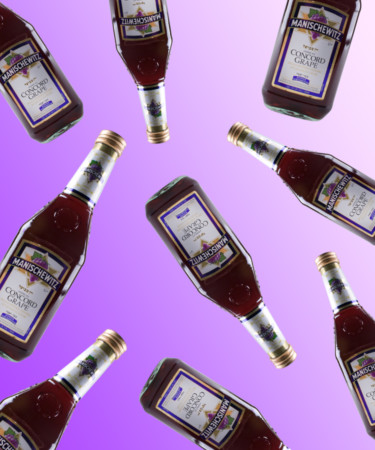Each Passover, alongside other rituals, seder-goers drink four glasses of wine while commemorating the freedom of the Israelities from bondage in Egypt. And no wine flows more freely on Passover than Manischewitz, filling that quartet of glasses with a sweet and syrupy concoction that’s become synonymous with the holiday.
The wine’s storied history begins in the 1940s at Brooklyn’s Monarch Wine Company, the owners of which set out to create a kosher wine for New York City’s Jewish immigrant population. Lacking the name recognition to garner interest, Monarch approached popular kosher manufacturer, Manischewitz, in Columbus, Ohio — proposing that in exchange for a licensing fee, Monarch could use Manischewitz’s name on its wine. Manischewitz agreed, and the rest is history.
In preparation for Passover, here are eight things you should know about Manischewitz.
It’s meant to be sweet.
Deciding which grapes to use to produce its wine, Monarch landed on the Labrusca variety native to upstate New York due to the region’s proximity to its operation in Brooklyn. However, the Labrusca grapes often produced a bitter, unpalatable taste, compelling the winemakers to add sugar to the wine to give it its trademark sweetness.
A commercial starring Sammy Davis Jr. marked the wine’s big break outside the Jewish community
Though consumption of the wine in its early stages was mostly limited to the Jewish community, a commercial featuring Sammy Davis Jr. singing a jingle about Manischewitz brought it to a larger audience, skyrocketing it to national popularity. (Davis himself converted to Judaism in 1961.)
Its popularity after the commercial was out of this world… literally
In a recording from the Apollo 17 mission, astronaut Gene Cernan can be heard saying during his spacewalk: “Manischewitz, look at that go! Did you see that?” It was later reported that Cernan often used “Manischewitz” as a stand-in for swearing.
Only some Manischewitz wines are kosher for Passover
Manischewitz’s recipe has morphed over the years to include corn syrup, an ingredient that does not qualify as kosher for Passover. The brand, however, continues to produce a special kosher bottle for Passover, using cane sugar in place of corn syrup.
Concord Grape is just one of Manischewitz’s offerings
While Concord Grape is certainly Manischewitz’s most popular and recognizable product, the wine comes in a number of other types, including blackberry, cherry, and elderberry. Its sweet wine styles include Cream White Concord, Cream Red Concord, and Cream Peach.
Manischewitz boasts a global export market
The sweet and affordable wine, costing an average of $5 for a 750-milliliter bottle, has gained popularity on a global stage. Of the 900,000 cases produced in 2015, The Wall Street Journal reported, 200,000 were exported to 20 countries around the world, led in market size by Latin America, the Caribbean, and South Korea.
The wine is popular among Asian communities in the States
Huy Trieu, a manager at Shun Fat Supermarket in San Gabriel Valley near Los Angeles, told The Wall Street Journal that the store sells hundreds of bottles of Manischewitz a year to primarily Chinese and Vietnamese customers. Tony Chen, a customs broker, also told the WSJ that he noticed many Los Angeles Asian grocery stores stocked bottles of the wine, and likened the taste of it to that of a fermented drink from Northern China made of mashed grapes and sugar.
You don’t just have to drink Manischewitz straight up
Manischewitz makes for a sweet, syrupy cocktail addition, too. These three VinePair-approved drinks — the Manischewitz Fizz, the Manhattan Jew, and the Mandelbaum — are made with the kosher wine and are sure to spice up your seder drink menu.
